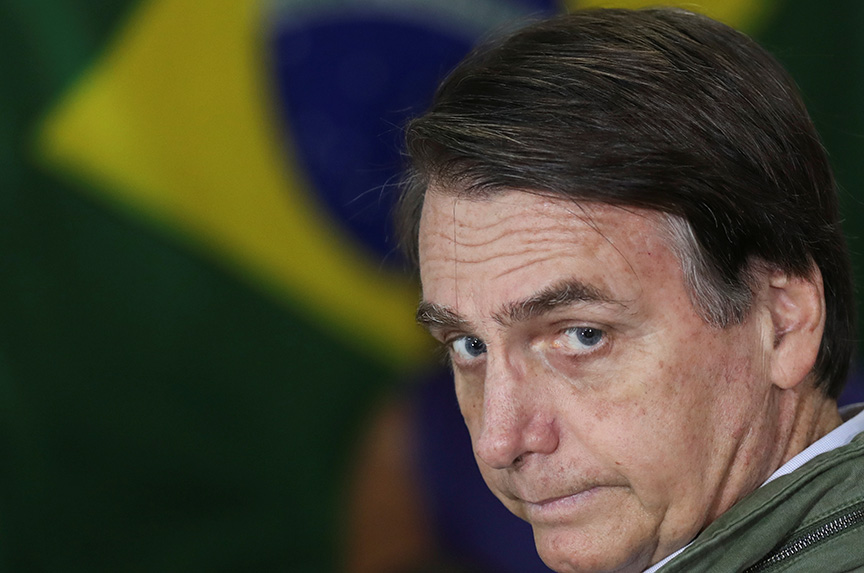Jair Bolsonaro, a far-right populist who has been compared to Donald J. Trump, won the first round of the presidential election in Brazil on October 7, but fell just short of the majority required to avoid a second-round runoff. The former army captain will face left-wing Workers’ Party (PT) candidate, Fernando Haddad, in a runoff on October 28.
Bolsonaro belongs to the Social Liberal Party (PSL). He has a history of making incendiary remarks about women, minorities, and gays; he has also promised to get tough on crime and corruption. He won just under 47 percent of the vote, his closest competitor, Haddad, got 28 percent.
“Bolsonaro’s near victory in the first round shows Brazilians are fed up with insecurity and corruption, and desperately want their economic fortunes reversed,” said Jason Marczak, director of the Atlantic Council’s Adrienne Arsht Latin America Center.
“Bolsonaro’s numbers clearly indicate the Brazilian system of years past is out the window and that the traditional political parties—as we have seen in other countries, most recently in Mexico—have lost the trust of the Brazilian electorate,” he added.
In Mexico, Andrés Manuel López Obrador, popularly known as AMLO, won Mexico’s July 1 presidential election by a landslide picking up more than 50 percent of the vote. AMLO was a member of PRD—the Democratic Revolution Party—before splitting from the party and forming Morena.
Bolsonaro has stirred passions in Brazil. In a 1993 congressional speech he declared he was in favor of dictatorship. He survived a stabbing on September 7 and was forced to campaign from his hospital bed. His opponents have rallied against him with the social media campaign #EleNão or #NotHim.
“Up against hyper polarization and extreme dissatisfaction, Brazilians voted out the country’s political establishment on October 7,” said Roberta Braga, an associate director in the Adrienne Arsht Latin America Center.
The fact that Bolsonaro fared as well as he did in the first round is at least in part an indication of the poor opinion many Brazilians have of Haddad and the PT because of the party’s history of corruption and mismanagement of the Brazilian economy. “Many, if not most, Brazilians will choose to abstain from voting rather than vote for either candidate in the second round, and many more will vote for Bolsonaro simply to keep the PT away from power,” said Braga.
Brazilians are also voting for all of the country’s state governors, two-thirds of the senators, all lawmakers in the chamber of deputies, and more than 1,000 seats in state legislatures.
“The first round of Brazilian elections saw the rise of fringe political parties like Jair Bolsonaro’s PSL and the fall of more established parties, including the Workers’ Party, at almost all levels of government,” said Braga. “In Congress, new representatives will come into office in a clear and strong push against the status quo. But in a country calling for political reform, fragmentation in Congress will remain.”
Marczak said the next Brazilian government will be hard pressed to quickly deliver results for the Brazilian people. “What will be critical will be that democratic institutions in Brazil continue to be as strong and robust,” he said.
Bolsonaro’s victory marks the first time since 2002 that the Workers’ Party has not won a presidential election. Former Brazilian President Luiz Inácio Lula da Silva, who was the front-runner for much of the past year, was knocked out of the running after an appeals court early this year upheld a corruption and money laundering conviction against him in the Operation Lava Jato (Car Wash) criminal investigation.
With Lula out, the Workers’ Party picked Haddad as its presidential candidate. Popular support for Lula, however, has not automatically transferred to Haddad, a former mayor of São Paulo.
Groups, including the Atlantic Council’s Digital Forensic Research Lab, have been closely monitoring disinformation around the election.
“In an extremely polarized election year, social media has played a crucial role and has had a big impact on voters’ choices. In particular, disinformation spread through social media platforms has had an increasingly worrying effect,” said Luiza Bandeira, digital forensic researcher at the Atlantic Council.
“This has become more true in the final week and on the very same day of the vote, when a great amount of false claims about fraud were spread. This is very dangerous since it can erode trust in institutions and democracy,” Bandeira added.
Braga warned: “With disinformation peppering discussions on WhatsApp and social media across the board, Brazilians must approach round two on high alert.”
Haddad faces what Braga said was a “an impossible uphill battle to turn things around, especially as the rate of abstentions, null votes, and blank votes exceeded the votes that went to Haddad in this round.”
Braga said a Bolsonaro victory in the second round is “almost certain.”
Ashish Kumar Sen is deputy director of communications, editorial, at the Atlantic Council. Follow him on Twitter @AshishSen.
Image: Supporters of Jair Bolsonaro, a far-right presidential candidate of the Social Liberal Party (PSL), celebrated in Brasilia, Brazil, on October 7. Bolsonaro won the first round of the presidential election, but didn’t get enough votes to avoid a runoff. He will now face Workers’ Party candidate, Fernando Haddad, in the second round on October 28. (Reuters/Adriano Machado)
